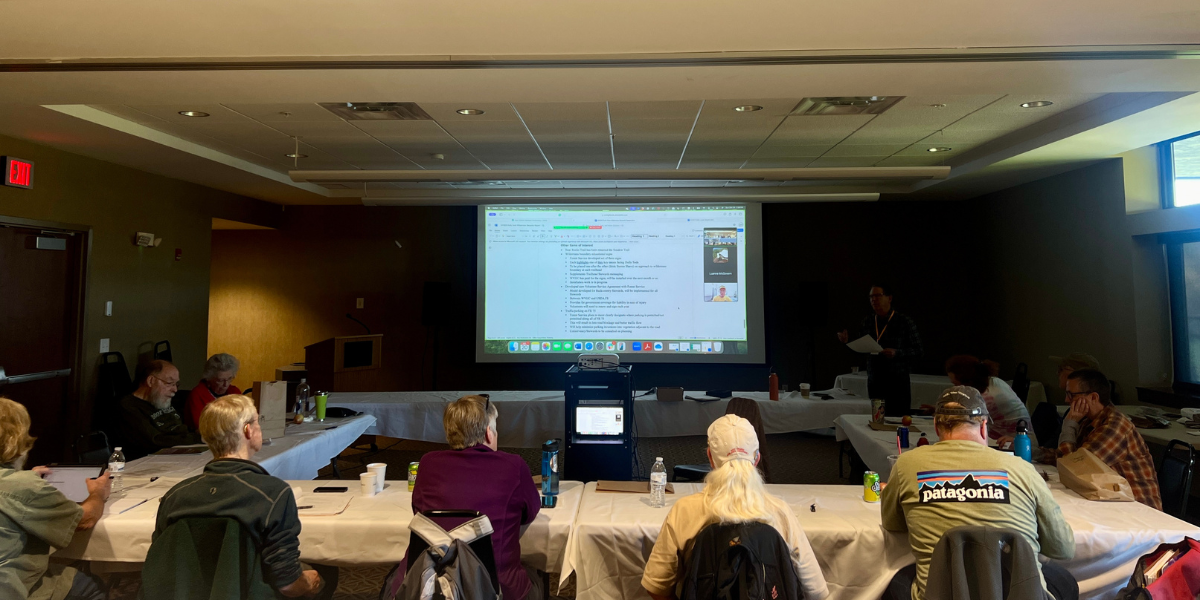By John McFerrin
The fall board meeting came on the last day of the Fall Review. We were just ending a successful Fall Review where we achieved the trifecta: had fun, learned a lot, and ate well. Unfortunately, Board membership is not all fun and games. Sooner or later we have to get down to business.
If this Board meeting had a theme, it was growing up. For most of the history of the organization we were an entirely volunteer organization. We funded ourselves through dues, donations, and some profits on things such as the hiking guide.
Now we have paid staff; we are starting to apply for grants. With those new circumstances we need to have things such as policies and procedures in place.
Our bylaws were written forty years ago. They reflect the organization (and the technology) of forty years ago. They talk about distributing notices and information by mail. Now a lot of our communication is by email; the bylaws need to reflect that. There are also other things in the bylaws that could be brought up to date. They require payments by check—so twentieth century.
We also don’t have such things as a conflict of interest policy that would help us should issues arise.
At a previous meeting, we had created a committee to review the bylaws. This time we also asked that committee to recommend policies that we might adopt to bring our organization up to date.
We also discussed making our investments consistent with the purposes of our organization. We have some savings which we need to put somewhere. A fruit jar buried in the back yard is not really an option. When making decisions on where we keep our savings, we want to be sure that we do not invest them in ways that are inconsistent with our values. For example, if a bank invests heavily in strip mining, we would not want the money it has to invest come in part from our savings. To avoid this problem, we are going to consider our investment policies.
Fall Reviews do not happen by accident. We are already planning for the 2025 Fall Review. It is set for October 31, 2025, at Blackwater Falls State Park. There was some small discussion on the kind of activities we have. Is more action, less sitting desirable?
Boards do not live by planning and organizing alone. We also got to hear about the interesting and exciting things we are involved in.
Olivia Miller gave her Program Director Report. She is still planning outings and doing tabling. She had for the Board’s inspection and delight the Highland Creatures coloring book. She is also doing some advocacy, particularly around Corridor H. We continue to get more and more activity on Instagram and Facebook.
Susan Rosenblum reported on the Rivers Committee. It continues to support the Citizen Scientists monitoring the streams that will be, or are, affected by the construction of Corridor H. Most streams are being tested monthly a month, some twice. Than Hitt has recently begun as the staff scientist at the West Virginia Rivers Coalition. He is enthusiastic about establishing citizen scientist programs to do testing all around the state so we will probably be collaborating with him.
Rick Webb reported on the goings on at the Allegheny-Blue Ridge Alliance. It continues its mapping project. It now has maps of thirty different projects. Its two newest ones show Concentrated Animal Feeding Operations and resources for hurricane relief.
ABRA has been active in the controversy over the project which the United States Forest Service calls the Gauley Healthy Forest Restoration Project, a name which the Committee considers a euphemism for timber harvesting. The threshold question is whether the project can proceed under what is called a Categorical Exclusion from the requirements of the National Environmental Policy Act. This procedure would allow the project to proceed without the environmental analysis that the Act requires. ABRA is also pursuing Freedom of Information Act requests on various projects, both on Corridor H and on mining near the Monongahela National Forest.
Finally, ABRA is working with others on litigation seeking compliance with mining laws by South Fork Coal Company. No litigation has been initiated yet although there have been preliminary steps.
Dave Johnston reported on the Dolly Sods Wilderness Stewards. The Stewards logged about 2700 hours, up from about 2200 last year. The Backcountry Stewards program (an addition since last year) is getting off the ground. The Crosscut Sawyer and Trail Maintenance teams completed several projects. The Trail Maintenance Team is somewhat constrained because the Forest Service wants to monitor the environmental impact of trail maintenance projects.
The Dolly Sods Wilderness Stewards has been awarded the Spirit of West Virginia Award by the West Virginia Tourism.
Andrew Young reported on the Extractive Industries Committee. It has been active in the Lexington Coal case, as reported in The Highlands Voice. The Committee is also headed toward a showdown with South Fork Coal. As also reported in The Highlands Voice, it is in chronic violation of various environmental laws. WVHC has sent a notice of intent to sue, a necessary precursor to litigation. If South Fork does not mend its ways, litigation will almost certainly follow.
Hugh Rogers reported on the work of the Highways Committee, entirely Corridor H. Right now, we are in suspense: the Draft Revised Environmental Impact Statement is due out any time now and we are waiting. When it comes out, we will be commenting on that.

